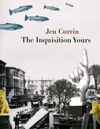The Inquisition Yours
In this, her third book of poems, Jen Currin is at her most elliptical. Yes, it’s a somewhat useless term, one replaced by something even more vague by the critic who coined it, but it is a term which has come to indicate a certain sort of poem to me, which Jen Currin’s poems are: not really fairy or folk-tale-like, but having commonalities with fantastic narratives with an object lesson; not really domestic surrealism, but certainly in love with the idea of slippage, the morphology of phrases when juxtaposed, etc.; not really symbolism in a heavy handed way, but light, contemporaneous, elliptical indications of meanings just beyond the text.
In this, her third book of poems, Jen Currin is at her most elliptical. Yes, it’s a somewhat useless term, one replaced by something even more vague by the critic who coined it, but it is a term which has come to indicate a certain sort of poem to me, which Jen Currin’s poems are: not really fairy or folk-tale-like, but having commonalities with fantastic narratives with an object lesson; not really domestic surrealism, but certainly in love with the idea of slippage, the morphology of phrases when juxtaposed, etc.; not really symbolism in a heavy handed way, but light, contemporaneous, elliptical indications of meanings just beyond the text.
These are poems which conjure thoughts, ways, gestures, fleeting glances, slipping glimpses, as indicated by the book’s epigraph, “Magicians were and will always be my companions,” and magic’s appearance and reappearance in the text. Does it add up? Is there pressure toward? This is not poetry about that: this is poetry about the numinous, the subtle and slightly esoteric ways of getting through days.
One of the markers Currin “elliptically” dodges is religion. She’s author of one book entitled Hagiography with no saints in it, and now a book with “Inquisition” in the title and the word “martyrs” repeating in several poems, but “Saint Beauty is a girl from elementary school” (“A Patriot”). Another marker might be politics. Lenin appears twice, but then, so does Buddha.
The poems are well-stitched to remind us we are in poems. Sound effects including slant rhymes and near-sounds create surface tension: “numb brides? Idols? Idle Minds?”, “ponder or wonder.” Most of the poems consist of honed couplets or single lines, although there are all varieties of free verse stanzas.
The poems in the QUESTIONS section are personal: a dead father is conjured to answer to the mother in the first, PAPERS, section. The poems in the third and last CHRONICLES section become angry, more fierce and full as they take on days lived under patriarchy, during war, entangled in gender relations and sexual politics. The joke in “Patriarch” is funny, a laugh is enacted, and we do laugh; “Subjective Data” is a fine poem. I find “Draft of an Essay” clever because a draft is an attempt and an essay is an attempt. Jen Currin writes “The tailor is now tearing the cloth” to end the poem, and this seems a very good way to run against the idea of the well-made poem, to indicate that the person assembling the clothing of the poem (usually by carefully piecing it), has resorted to tearing the fabric, tearing the scrim, indicating, uncovering, reality.





